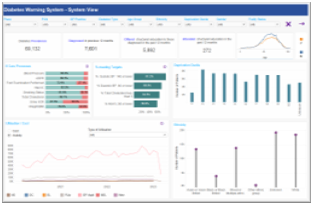Over 6.5% of the population in Bedfordshire, Luton and Milton Keynes (BLMK) has been diagnosed with diabetes and a significant proportion are people from ethnic minority backgrounds residing in high-deprivation areas.
Clinicians needed a tool that would support them in adhering to core care processes leading to improvements in quality of life and a reduction in adverse outcomes. Arden & GEM’s Advanced Analytics Unit (AAU) has created a tool that not only provides near real-time population-level data and benchmarking but also identifies patients with unmet needs for proactive interventions.
The challenge
- There are almost 70,000 people living with diabetes across BLMK, with more than a quarter of patients living in an area that is among the 30% most deprived areas in England.
- Studies show that proactive completion of eight core care processes for diabetes reduces mortality, yet less than a third of people living with diabetes in BLMK had all eight care processes completed in 2022/23 with significant variation between GP practices
- Existing data sources, including NDA and SystmOne, were out of date, limited in functionality and unable to combine patient and population level reporting.
Our analytics solution
BLMK ICS approached AAU to co-design and create an early warning system which would identify patients living within the ICS with unmet needs, who would benefit from support to manage their diabetes. This would enable clinicians to proactively invite patients to review the management of their condition and identify patients who may benefit from immediate clinical attention. This would also allow rapid selection of patients who require a medications review based on the latest NICE guidelines and reduce admissions, avoiding potential complications.
What we did
Working alongside clinicians, including a GP and a specialist diabetes nurse, a near-real-time dashboard was developed to detect and re-identify patients living with different types of diabetes (excluding gestational diabetes) with unmet needs.
By bringing together data from different sources, more than 16 million records, spanning three years, covering events for BLMK diabetes patients are processed to populate the dashboard.
A summary view has been developed, at a PCN and practice level, to show prevalence levels and recent diagnosis figures. This insight supports referrals to structured education programmes as well as identify gaps in care for rectification. Summary and benchmarking views are also available to policymakers.
"Having a dashboard which not only provides contemporaneous population level data and benchmarking but also supports identification of people with high unmet need (with the ability to define parameters accordingly) would be extremely helpful for practices in optimising proactive diabetes care and population outcomes."
Chirag Bakhai GP, Strategic Lead for Long Term Conditions at NHS BLMK ICB
Key features supporting direct patient care
The dashboard includes a case-finding tool to support GPs to easily identify and better understand who could benefit from immediate attention. The tool provides clinicians with a prioritised list of patients who should be contacted to run through their eight diabetes care checks.

Individual patient records can be selected to view longitudinal clinical and event information, including risk scoring and historic admission information. Patients can be re-identified by clinical users with appropriate access. The tool also includes a theograph which shows a visualised whole picture view of a patient’s health encounters within all care settings.
Current and potential benefits
- Clinicians can identify patients who may benefit from immediate clinical attention and proactively invite them to review the management of their condition
- The tool allows clinicians to rapidly select patients who require a medications review based on the latest NICE guidelines, reducing potential admissions and avoiding complications
- Completing care processes throughout the year rather than at year-end encourages early contact with GPs, empowering patients to manage their condition with the most up-to-date information
- Patients with poorly managed diabetes can be easily identified and referred to structured education
- The tool helps raise awareness of data quality issues with GP practices to support resolution
- The system provides a holistic picture of diabetes care across the ICS
- The patient view shows all of the patient’s conditions, giving insight into their overall picture of health.
"The AAU team has worked with the ICS Clinical Lead for Diabetes and the Nurse Consultant for the Community Diabetes Service to build a Long Term Conditions warnings and alerts tool that addresses the eight care processes critical to the management of patients with diabetes. For each patient, the tool informs the clinicians whether each care process is up to date and whether the corresponding measure is within expected range. The tool alerts the user of any patient that is out of range and may need specific follow-up with further functions to drill down on past trends. The development has attracted high praise from both of the clinical sponsors."
Charles Wheatcroft, Programme Manager - BI & Analytics at NHS BLMK ICB
You can find out more about the Advanced Analytics Unit here.
